We tried Public Goods to see if this membership-only online store is worth it
Is this your one-stop shop for all household items?
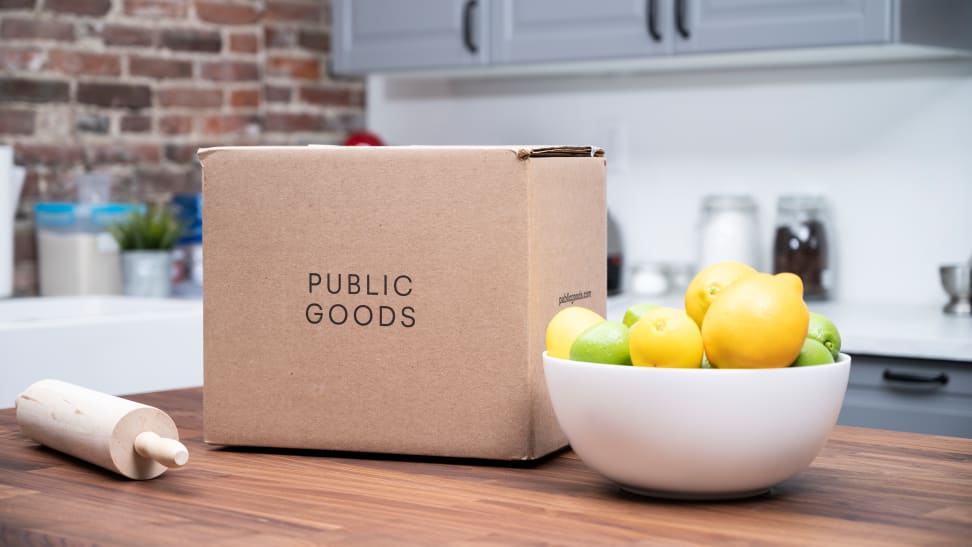 Credit:
Reviewed / Jackson Ruckar
Credit:
Reviewed / Jackson Ruckar
Products are chosen independently by our editors. Purchases made through our links may earn us a commission.
Choices, choices, choices! It’s what we all think we want, but when push comes to shove, having too many options can cause information overload and decision paralysis. At least, that’s how I feel when I wander through the aisles of the supermarket trying to plan my meals for the week or when I’m perusing soaps at the drugstore. The truth is, sometimes I don’t want choices—I want to have a narrow field of products that will do exactly what they’re intended for. (It’s no wonder I ended up working for a product review website dedicated to finding the best of the best, right?)
In comes Public Goods, an online-only retailer that’s landing page displays: “Just one version of every essential in just one place.” You can find everything from shampoo to laundry detergent to pasta, but Public Goods cuts out extreme excess with minimalistic packaging and product selection. (I.e., you won’t find eight different brands of toilet paper with different ply amounts and sheet counts within each—you’ll just find the Public Goods branded toilet paper.) Now, that is something I can get behind … assuming the quality is also there.
To get an idea of what Public Goods is about, we tested its top products across several categories and took notes along the way.
What is Public Goods?
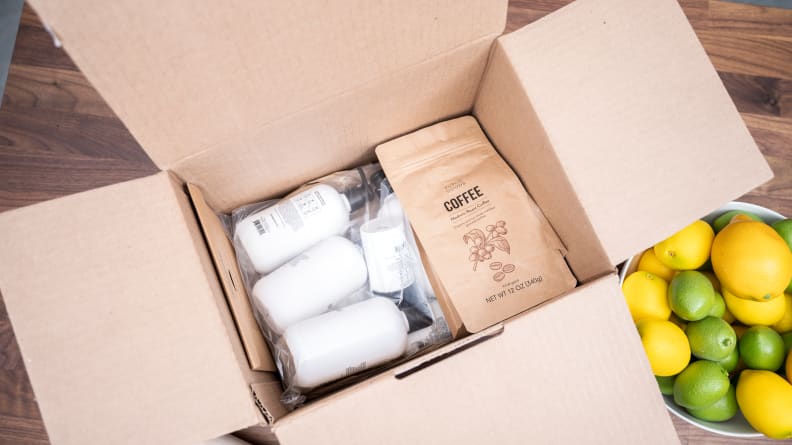
You can sign up for a two-week free trial of Public Goods to try the products.
The attribute that stands out the most when you look at the website is the brand’s commitment to sustainability. For one thing, it partners with Eden Reforestation Projects to plant one tree for every purchase made on the site or (free) email sign-up. Aside from that obvious gesture of planting trees in exchange for orders, the company uses materials like bamboo in place of paper to avoid deforestation, and sugarcane in place of single-use plastics that take years to break down for its containers. It also sells refill versions of several products, like shampoo and conditioner, to avoid wasting bottles. When it comes to ingredients, Public Goods claims that all products are free of “controversial” ingredients like parabens, phthalates, and sulfates.
Like many trendy, Instagram-worthy brands, Public Goods requires a membership should you want to continue using it after the 14-day trial. It’s $59 per year for access to the store, with free shipping on orders of $45 or more and the option to cancel at any time, including a prorated refund for whatever portion of the year you didn’t use. The brand claims that “most brands go through four suppliers before selling you a product” and “that adds cost at every step.” The company’s solution: “We work through a membership model instead that allows us to deliver the highest quality at a minimal margin.” Curiously, I spotted some Public Goods personal care products in my local CVS in Boston, so it’s not impossible to get your hands on some of the goods without a membership.
We did not test the membership aspect, as our primary focus for this review is trying the popular products to determine if subscribing is worth it at all, but the cancellation process entails emailing customer service, and I couldn’t find many complaints from users about it being difficult.
What’s it like to use Public Goods personal care products?
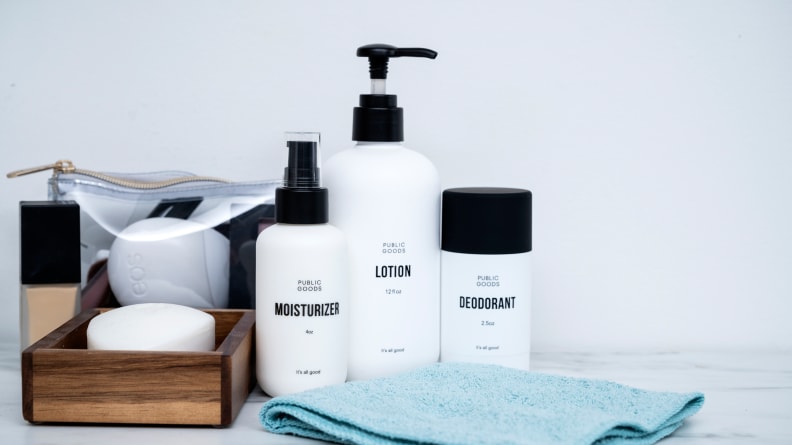
Public Goods' personal care items are on par with drugstore prices for similar items.
The most popular personal care items at the time of our purchase were the facial moisturizer, lotion, body wash, shampoo, conditioner, and deodorant. I tested the first five of that list and left deodorant testing up to Courtney Campbell, Reviewed’s shopping editor, who actually found a natural deodorant she likes.
Public Goods Facial Moisturizer ($4 for 4 ounces): If you’re looking for a no-frills daily face moisturizer that’ll leave your skin feeling hydrated with minimal application time, this is it. I use two to three pumps on my clean face and neck and it blends right into the skin, leaving behind no residue, shine, or pilling. I sometimes experiment with high-end products that make claims about anti-aging or dark-spot correcting, but I always come back to a plain everyday moisturizer (usually the E.L.F. Cosmetics Daily Hydration Moisturizer) and this fills that bill. I also love that this comes with a pump, which is more hygienic and easier to use. And I love the scent. It’s a clean, sweet aroma, but in the ingredient list, it only says “natural fragrance,” so your guess is as good as mine as to what creates it.
Public Goods Body Lotion ($4.50 for 12 ounces): This body lotion immediately gained points when I saw that it had a pump like the facial moisturizer. Picking up a squeezable tube or unscrewing a lidded jar to dip into product once you’ve started applying lotion is messy to me. With this, I could get a squirt, thoroughly rub it into my skin, and go back for another pump without even looking up. It may sound nitpicky, but when I get out of the shower at night and am eager to get into my pajamas, little things like a lotion with a pump actually get me to partake in this often overlooked step. (My dry skin thanks you, Public Goods.)
The lotion itself absorbs into the skin easily and quickly, even when my skin is still damp from the shower. I didn’t love its scent, which reminded me of a bland herbal tea, made with essential oils from cornmint, lemon, cedar, western red cedar, eucalyptus, patchouli, amyris balsamifera bark oil, lavandin, and galbanum (yeah, my eyes glazed over after "patchouli," too). The good news is that the aroma doesn’t linger for long, and my latest routine involves following up my shower with a few spritzes of a deliciously coconut-y Sol de Janeiro body spray that overpowers this fragrance, anyway.
Public Goods Body Wash ($4.50 for 12 ounces): The body wash (and shampoo and conditioner) use all of the same essential oils for fragrance—orange, geranium, cinnamon, mandarin, nutmeg, petitgrain, rosewood, celery seed, grapefruit, and vetiver—it creates an earthy aroma, which I did not care for. As far as its cleansing power goes, I felt it was perfectly adequate. I prefer body washes that leave me feeling clean without drying out my skin or leaving behind a residue, which this one achieved. If I love a body wash’s scent, I want it to linger post-shower. In this case, I was happy the fragrance didn’t stick.
Public Goods Shampoo ($4.50 for 12 ounces) and Public Goods Conditioner ($4.50 for 12 ounces): I’m willing to splurge on hair products, as I spent a lot to transform my hair from my natural brunette color to the blond I have now and want to maintain the results. I’ve used a shampoo and conditioner from Matrix, totaling $46. I’ve even tested the popular customizable hair service, Function of Beauty to see its impacts on my medium-textured, wavy-curly locks.
The great news for Public Goods: In comparison with those products, I found its shampoo and conditioner up to snuff, leaving my hair squeaky-clean post-shampoo and relatively soft and moisturized-feeling post-conditioner. Again, I didn’t love the earthy fragrance derived from essential oils rather than synthetic fragrances, but it didn't linger post-shower, and for a total of $9 for the duo, I won’t knock them too hard for a superficial (and fleeting) attribute. I prefer to use a conditioning mask on my hair in place of conditioner, as I have dry, damaged hair, so I don’t see these replacing the products already in my shower, but I would use both again with no real complaints.
Public Goods Deodorant ($4.25): This product claims to keep you smelling good with a natural fragrance and a formula that’s “vegan-friendly,” “cruelty-free,” “gluten-free” (though you’re not eating it, of course), and free of the controversial ingredients we already went over. It doesn’t claim to be free of aluminum, the commonly used antiperspirant ingredient that some people like to avoid, but it’s not listed in the ingredients, either.
All that said, it was also “free” of the attributes Courtney looks for in a deodorant. She says: “I did not love this and I think it lasted like two hours before I had to reapply. I used the product for about two weeks but did not see an improvement in how fast I started to stink after using it. The application also felt very wet compared to other deodorants I’ve used and I still prefer Native to this. It also smelled like cologne of Axe in a very mild way, and I did not like the scent.”
What’s it like to use Public Goods household products?
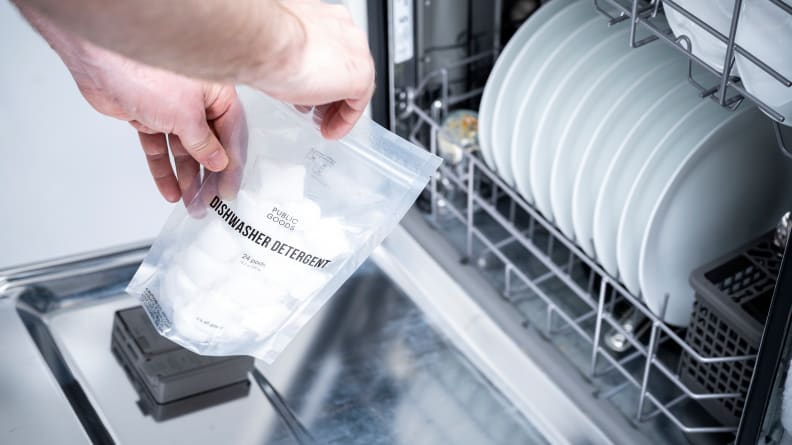
We tested the Public Goods Dishwasher Pods against the Seventh Generation and Cascade.
Among the plethora of household items Public Goods offers, we tested the hand soap, dishwasher pods, trash bags, and reusable food storage wraps. We wanted to test the paper towels, a paper product made with bamboo as an alternative to wood pulp, but they were sold out. For each of these, I leaned on Reviewed’s home and kitchen teams, who test these sorts of things more than I do.
Public Goods Hand Soap ($4.50 for 12 ounces): Senior editor Leigh Harrington tried this liquid hand soap at home to see what makes it different. Her experience: “When you pump out Public Goods liquid hand soap, you can smell a fresh aroma of orange essence immediately, but it’s not overpowering or fake. When you’re done, there’s no residue leftover unlike other moisturizing hand soaps. Your hands just feel completely clean. With that said, it doesn’t dry out your skin either, even after repeated daily washings in this COVID-19 era. I’ve been prone to cracking and drying in the past, but not while using this product. I adore its natural scent and clean feel. I love how the bottle’s simple white and black presentation looks good next to my kitchen sink and blends in with my decor. My style is more boho-rustic, but the packaging can just as seamlessly blend with a more modern or contemporary home decor. I’ve been using this hand soap for about three weeks, since it arrived. It’s by my kitchen sink, a central hand-washing location in my house, so it gets a lot of use. I’m about halfway through the 12-fluid-ounce bottle, and I will continue to use it until it runs out. I’ll definitely be ordering the 34-ounce hand soap refill ($11) from Public Goods.”
Public Goods Dishwasher Pods ($6.95 for 24): Jonathan Chan, Reviewed’s lab manager, tested these pods in our labs by creating a set of baked-on cake, spinach, tomato soup, and cheese stains. He says: “The results were acceptable compared to other ‘eco-friendly’ brands. I tested these tablets against Seventh Generation (the leading brand of eco-friendly detergent) and Cascade Platinum (the leading brand overall). The Public Goods tablets did as well as Seventh Generation but performed worse than the Cascade. Honestly, I wouldn't stress too much about which dishwasher detergent pods you use. The lion's share of work is done by the dishwasher, with soaking and scraping excess food as the next big chunk, and the final sliver being the detergent. If you're already a Public Goods member, you might as well get the dishwasher pods. They work fine and are environmentally friendly.” In terms of prices, the Public Goods ones cost at about 28 cents per pod, with Seventh Generation costing about 26 cents and Cascade costing 33 cents.
Public Goods Recycled Trash Bags ($4.50 for 45): Reviewed managing editor Meghan Kavanaugh put these 13-gallon bags to the test in her home. She reports: “I didn’t expect to like these trash bags. Sure, I loved the fact that they were 100 percent recycled and oxo-biodegradable [Public Goods claims they degrade in five years versus the 1,000 it takes other bags], but would they hold my trash? After all, if it split on my way out the door, what’s the point?
I’ve used about half a dozen of these bags and can report that they are strong, even when stuffed to the brim. They also hold their shape fairly well. They’re easy to tie off and carry, and they seem to block odors well. My complaints are minor. I mostly missed the drawstring closure of the Hefty trash bags I usually use—it’s ever so slightly more convenient than tying the bag by hand. And I wish the roll of Public Goods bags came in some sort of reusable container, even just as an option for the first purchase. It’s not a deal breaker, but the loose roll would’ve been easier to manage if it could sit in a box of its own. It’s hard to give a glowing review of a garbage bag, but these kitchen bags from Public Goods got the job done and didn’t make my life harder, which is really all you can ask for.” What's more: The Hefty ones cost about 16 cents per bag compared to Public Goods’ 10 cents.
Reusable Food Storage Wraps ($14.50 for three): Leigh also tested these wraps, reporting mixed results: “The Public Goods reusable beeswax wraps feel nice in your hands. They’re weighted and heavier than plastic wrap or aluminum foil and seem to be impervious to airflow. They soften up from the heat of your hands, making them easy to form around a food item. In my experience, in order to create a seal, you have to spend a few minutes warming the wrap, then forming the wrap, and then warming it into place again, in order for the seal to remain stuck once you place it in the refrigerator. If you don’t, the seal loosens and the wrap begins to unfold. As a working mother, I don’t have the luxury of taking five minutes to wrap up a sandwich or leftovers. The wraps are washable, yes. However, I found that it’s hard to remove food stains from the beeswax-coated cotton. For example, I wrapped up a piece of chicken breast that was coated in herbs and spices like paprika and dill. The paprika stained the wrap, and I wasn’t able to remove the stains, even when using Ultra Ajax Triple Action degreasing dish detergent. The bits of dill did eventually wash off, but I had to rub them out of the beeswax piece by piece.”
What’s it like to use Public Goods grocery products?
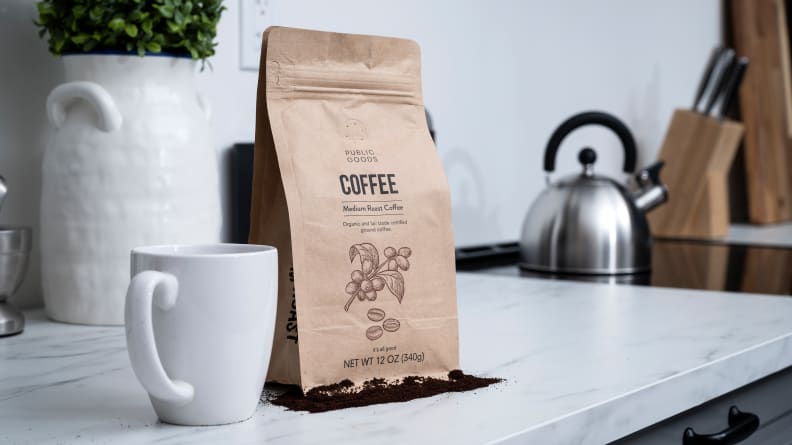
Public Goods' grocery selection is limited, but we put the Ground Coffee to the test.
In its grocery section, Public Goods offers pantry staples like spices, boxes of pasta, sauces, soups, teas, and more. Our kitchen staff writer, Valerie Li, put the brand’s ground coffee to the test, as it had more reviews than many of the other available products. Plus, Valerie is no stranger to testing coffee products and recipes for us.
Ground Coffee ($6.50 for 12 ounces): “The ground coffee tasted clean and smooth. However, it doesn’t live up to its promise of offering the ‘nuanced flavors’ of specialty coffee that it claims to. For the price, it seems like a bargain, but if you’re interested in tasting the full-bodied, nuanced flavors of true specialty coffee, you may want to consider subscribing to a coffee subscription service. The product claims to practice fair-trade standards, which means the coffee growers are compensated above industry average and are guaranteed minimum pay in case of bad growing seasons. I’m not sure about the claims regarding ‘healthy ingredients’ and ‘no preservatives’ because coffee usually doesn't have those anyway. If you’re looking for a budget-friendly option while shopping at Public Goods, this coffee will meet your expectations.”
Should you sign up for Public Goods’ membership?
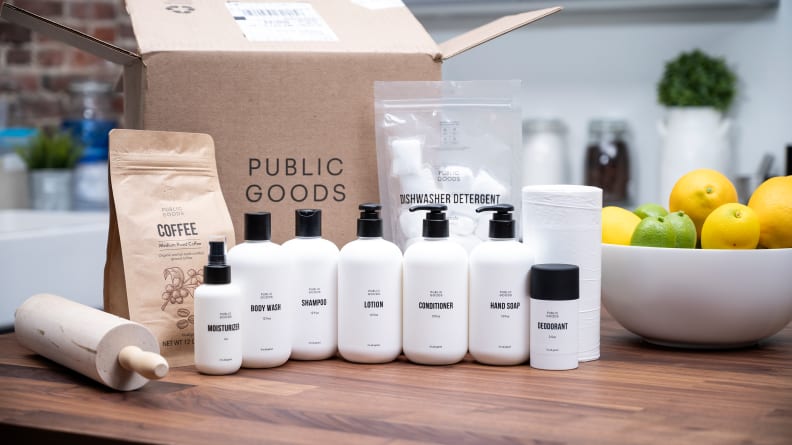
Public Goods offers an array or products, but not so much that shopping is overwhelming.
If you want a one-stop shop for household items such as trash bags, hand soap, shampoo, body wash, and more, Public Goods is worth it. Even taking into account the membership fee, the price is right, and it takes the guesswork out of buying products. And, if our reviews of the variety of products we tested are any indication of your experience, you’ll find all the products adequate at the least and must-haves at most. And if you prefer not to go to a physical store or dread lugging things like paper towels and laundry detergent home, having them shipped right to you is also a plus. Yes, you can have that same experience when you purchase at online retailers, but for the reasons mentioned above (price, solid quality, and no guesswork), you may find this an even better shopping experience.
However, if a new online grocery store is what you’re looking for, you’re likely better off with a membership to Walmart+, Prime Pantry, or Thrive Market, as the Public Goods pantry selection isn’t vast enough to cover all your needs.


